Top 20 Star Trek Episodes (10-1)
(See numbers 20 through 11 here!)
It is Star Trek month here at emagill.com, leading up to the release of the new J.J. Abrams movie. For the next few weeks, I will embrace my Trekkiness (and yes, I consider myself a "trekkie" rather than a "trekker") and espouse my opinions about which are the best episodes, which are the best movies, which are the best villains, and then how I feel about the new film.
Star Trek is a remarkable phenomenon--one that is not likely to die--and it can be attributed to any number of things; the uplifting vision of a better future, the prescient social commentary, the exciting space opera, etc. I feel no shame in talking about Gene Roddenberry's brainchild on the Internet, for without Star Trek (and porn), the Internet might not have ever caught on.
If you missed the first few weeks, click here to check out the Top 10 Star Trek Villains or the Top 5 Best & Worst Star Trek Movies.
This week, we're going to finish up my list for the best episodes of the show. This is the most mercurial and subjective of the Star Trek lists; it would have been different if I'd made it six months ago and it'd probably be different if I made it six months from now. There are at least a dozen episodes I wanted to include but couldn't, and I'm sure there are really fantastic episodes I'm forgetting. While every Star Trek show is represented somewhere on this list, it does show that I have my biases and preferences. But hey, this is my list, not yours, and if you have any problems with it, feel free to include your own top episode list in the comments at the end.
#10
"The Tholian Web" (TOS)
| 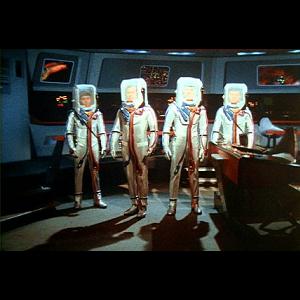
"Bones, Spock, since you are playing this tape, we will assume that I am dead and the tactical situation is critical and both of you are locked in mortal combat." |
#10
"The Tholian Web" (TOS)
| 
"Bones, Spock, since you are playing this tape, we will assume that I am dead and the tactical situation is critical and both of you are locked in mortal combat." |
The Enterprise comes across the USS Defiant, which is phasing out of existence with a crew that apparently killed itself. While attempting to piece together what happened, the Enterprise is confronted by a xenophobic race of bizarre aliens called the tholians. Captain Kirk is lost while the away team beams back to the Enterprise, himself phased out of existence like the Defiant. Things start going haywire on the Enterprise, and the impatient tholians begin forming a strange web of energy around the ship. Then an apparition of Captain Kirk in his environment suit appears, which is sufficiently creepy, and Spock is able to figure out how to save Kirk and the Enterprise. This episode is one of the best of the original series, and it is in no small part due to the tholians. They live in incredibly high heat and are largely unseen until an episode of Enterprise nearly forty years later. Additionally, the episode is tense and unsettling in a way that is rare for Star Trek. It makes this list because of the tight writing, masterful direction, and ground-breaking special effects (which earned an Emmy).
#9
"Tapestry" (TNG)
| 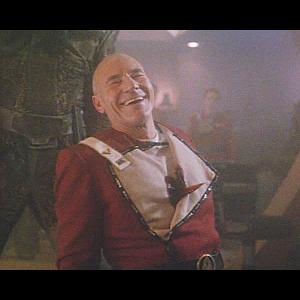
"There are many parts of my youth that I'm not proud of. There were loose threads, untidy parts of me that I would like to remove. But when I pulled on one of those threads, it had unraveled the tapestry of my life." |
#9
"Tapestry" (TNG)
| 
"There are many parts of my youth that I'm not proud of. There were loose threads, untidy parts of me that I would like to remove. But when I pulled on one of those threads, it had unraveled the tapestry of my life." |
"Tapestry" opens with Picard being brought to sick bay following what appears to be a fatal phaser wound to the chest. As he is on the brink of death, he finds himself in an afterlife of sorts, with the irrepressible Q greeting him on the other side. Q engages Picard in a metaphysical discussion in which he learns that Picard regrets his reckless youth. Apparently, as a cadet, Picard was stabbed through the heart by a Nausicaan during a bar brawl, which lead to his requiring an artificial heart, the heart that may have been responsible for his death. Q forces Picard to relive this time of his life, and when Picard decides to play it safe and responsibly, it permanently alters his future so that, as an older man, he is an uninteresting junior officer with no ambitions. Picard ultimately decides he would rather die as his former self than live the rest of his life in meaningless obscurity, so Q returns him to the sick bay, where Dr. Crusher successfully revives him. The episode is a simple--but effective--parable about regret, and it's a story I often reflect upon when I think of how stupid I was when I was younger. Any episode that has the power to relate so poignantly to everyday thoughts and experience deserves to be recognized.
#8
"The Trouble with Tribbles" (TOS)
| 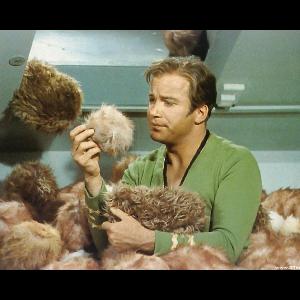
"Well the nearest thing that I can figure is that they're born pregnant, which appears to be quite a time-saver." |
#8
"The Trouble with Tribbles" (TOS)
| 
"Well the nearest thing that I can figure is that they're born pregnant, which appears to be quite a time-saver." |
One of the most beloved episodes of the original series, "The Trouble with Tribbles" is sheer genius. The plot of the episode centers around a confrontation between the klingons and the Federation (over grain, of all things) at a deep space station at the border between Federation and klingon space. It's the subplot that takes over, however, as a race of little creatures called tribbles starts to multiply at an incredible pace. A tribble is a small ball of purring fur that is irresistably cute to most humans. Unfortunately, once you feed a tribble, it gives birth to an already-pregnant offspring. Additionally, tribbles hate klingons. Not only do the tribbles start to overrun the space station and the Enterprise, they also turn out to be the plot device that reveals a klingon spy who has poisoned the much disputed grain (which the tribbles have also eaten). There is nothing terribly poignant or meaningful about the episode, but it has an undeniable charm, much like the tribbles themselves. It makes this list, however, and almost every list like this one, because it is so much fun.
#7
"Trials and Tribble-ations" (DS9)
| 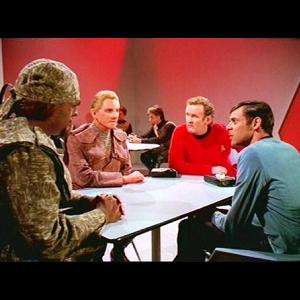
"Another glorious chapter in Klingon history. Tell me, do they still sing songs of the Great Tribble Hunt?" |
#7
"Trials and Tribble-ations" (DS9)
| 
"Another glorious chapter in Klingon history. Tell me, do they still sing songs of the Great Tribble Hunt?" |
"Trials and Tribble-ations" earns a higher spot on this list than "The Trouble with Tribbles" because it is such an impressive technical achievement. When the makers of Deep Space Nine decided to revisit a classic episode of Star Trek to honor the franchise's 30th anniversary, it was inevitable that they'd wind up bringing back the tribbles. "Trials and Tribble-ations" is just as amusing and funny as its predecessor, and it contains some of my most-quoted lines in Star Trek. The story involves an older Arne Darvin (the klingon spy from the original episode), who throws the Defiant into the past so that he can kill Captain Kirk with a bomb planted in a tribble. Sisko and his crew then pose as the older-era Enterprise crew, injecting themselves into several scenes from the original episode, so that they can track down Darvin and the bomb. It's utter silliness, but that's what makes it so great. But the technical achievement of the episode is something you should not ignore, as they were able to integrate the actors of Deep Space Nine with the digitally restored footage of the original series. It's truly an impressive feat, and the episode is a blast to boot.
#6
"Yesterday's Enterprise" (TNG)
| 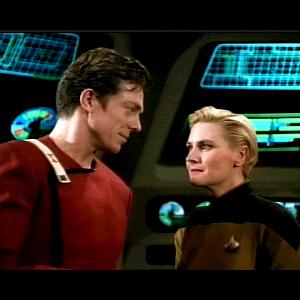
"Tell me about... Tasha Yar." |
#6
"Yesterday's Enterprise" (TNG)
| 
"Tell me about... Tasha Yar." |
The rules of time travel are constantly changing in the Star Trek universe, but occasionally, an episode comes along that brings a fresh idea to the table. "Yesterday's Enterprise" is an episode where a ship from the past--the Enterprise NCC 1701-C to be exact--is suddenly transported to the future. The future is immediately changed, and we see a very different crew on board the Enterprise-D. The characters are the same people, but they are battle-worn and dark. Most shocking, however, is the appearance of the formerly deceased Tasha Yar, a character who died in the very first season of the show. It turns out that, in order to restore the timeline, the Enterprise-C has to be sent back to the past where it will be destroyed in a hopeless battle. Since the alternate future is bleek beyond words, as the Federation is on the brink of collapse due to a long-standing war, Picard chooses to send yesterday's Enterprise back in time to die, with the addition of Yar. The only character in the episode who seems able to discern what is going on is the enigmatic Guinan, who is never supposed to have known Yar as Guinan came aboard the ship after her death. It is increasingly rare to see time travel treated in a novel way, but "Yesterday's Enterprise" succeeds in not only doing that, but in giving a nearly forgotten character a more meaningful death. It is an interesting and touching episode, and one of the best of Next Generation's entire run.
#5
"The Best of Both Worlds" (TNG)
| 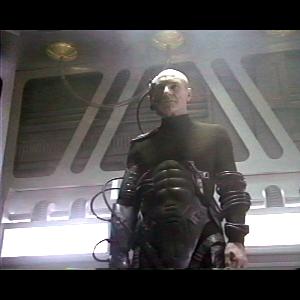
"I am Locutus of Borg. Resistance is futile. Your life, as it has been, is over. From this time forward, you will service us." |
#5
"The Best of Both Worlds" (TNG)
| 
"I am Locutus of Borg. Resistance is futile. Your life, as it has been, is over. From this time forward, you will service us." |
Before you ask, I consider both parts to be the same episode. And what an amazing episode! It took a couple of years for Star Trek: The Next Generation to break away from its predecessor, but when "The Best of Both Worlds" came along, it rewrote the show's paradigm. This episode is impossibly epic, dealing with a sudden and devestating invasion by the Borg. Starfleet is helpless in the face of such an imposing force, and at Wolf 359, they are handed the single greatest military defeat in human history (before the Dominion War). The season-ending cliffhanger between the two-parts is shocking, because it occurs once it is revealed that Captain Picard has been assimilated and when Riker, acting as the new captain, opens fire on him. This episode started the trend in Star Trek of ending every season with an epic cliffhanger, but "The Best of Both Worlds" is easily better than any of the ones that followed it. What makes it so good, I think, is that the writer of the episode, Michael Piller, wrote the first part under the assumption that it would be the last episode he would ever write. He had no idea how to solve all of the major conflicts of the cliffhanger--how to defeat the Borg, how to save Picard, and how to keep Riker from leaving the Enterprise--and in fact wrote the episode so that it would be nearly impossible to solve them. When he came back to write the second part at the start of the new season, it was both karmic justice and the perfect way to ensure that the story would follow through. Piller managed to find brilliant ways out of all three central problems, and that alone makes him deserving of recognition. More than just the writing, however, puts this episode on this list. There are awesome special effects (unprecedented by this point in Trek), a fantastic original score (the best single episode score), and some of the best acting the show has to offer--especially from Jonathan Frakes (Riker) and Patrick Stewart (Picard/Locutus). While the four episodes that follow on this list are, on the whole, better than "The Best of Both Worlds," make no mistakes: this is the most badass, balls-to-the-wall awesome episode in all of Star Trek.
#4
"Similitude" (ENT)
| 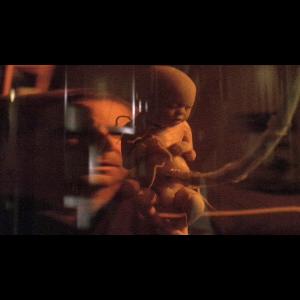
"I have his memories. I have his feelings. I have his body. How am I not Trip?" |
#4
"Similitude" (ENT)
| 
"I have his memories. I have his feelings. I have his body. How am I not Trip?" |
In every Trek series, there is an episode so good that it stands out as an anomaly. For Enterprise, that episode is "Similitude," in which Trip, on his death bed thanks to irreversable brain damage, is cloned. The cloned Trip, named Sim, lives his life at breakneck speed--matching Trip's age in a manner of days--and begins to accumulate his predecessor's memories. When Sim learns that he was only created so that his brain tissue could be harvested to save Trip, the ethical quandary becomes painfully real. It is a mind-bending story that manages to comment on a real world issue without shying away from the grey moral implications. It is also incredibly emotional and powerful, climaxing at the point in which Sim, volunteering to be killed so that Trip may live, tells Doctor Phlox that he was a good father to him. It's one of the only Trek episodes--one of the only episodes in all of television--that can make my eyes water. But it makes this list because it is so stunningly original and creative, and because it is able to comment on politics, metaphysics, and the human condition in a surprisingly clever way.
#3
"In the Pale Moonlight" (DS9)
| 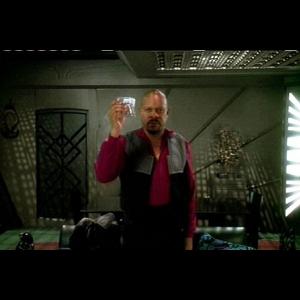
"This is a huge victory for the good guys!" |
#3
"In the Pale Moonlight" (DS9)
| 
"This is a huge victory for the good guys!" |
This is a controversial episode for many traditional Star Trek fans. It is, without a shadow of a doubt, the darkest episode of any Trek series ever produced, and some are quick to argue that it goes against the very ideals of Gene Roddenberry's vision. The plot centers around Captain Sisko's efforts to involve the Romulans in the Dominion War, as Romulan involvement is probably the only way there can be a shred of hope for victory (as it ultimately turns out in the show, the Romulans are key to winning the war). Sisko, with the help of Garak, gradually finds himself willing to commit more and more shocking transgressions in order to achieve his goals, sliding down the slippery slope into the most questionable of behaviors. In the end, he reports in his log:
So, I lied. I cheated. I bribed men to cover the crimes of other men. I am an accessory to murder. But the most damning thing of all: I think I can live with it. And if I had to do it all over again, I would. Garak was right about one thing: a guilty conscience is a small price to pay for the safety of the Alpha Quadrant. So I will learn to live with it. Because I can live with it. I can live with it.
The thing is, I'm not so sure Roddenberry would have disapproved of this episode. In extreme times of war, men are sometimes forced to do terrible things, and it usually happens one small compromise after another. War itself is an exercize in mass murder, but sometimes, unfortunately, it is necessary. As a man who was decorated with the Distinguished Flying Cross and the Air Medal, I think Roddenberry would have understood that. Whether or not he would have greenlit that kind of message for mass consumption is another story altogether, but regardless of what the man would have thought of the episode, "In the Pale Moonlight" is incredible. It is one of the most expertly written episodes in the entire library of Trek episodes (credit: Peter Allan Fields, Michael Taylor, and Ronald D. Moore), and the way events unfold is subtle and logical. If there were ever an episode of Star Trek that left me speechless when I first saw it, this is that episode.
#2
"The Inner Light" (TNG)
| 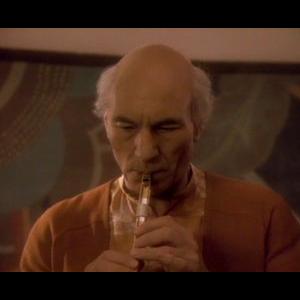
"If you remember what we were and how we lived, then we'll have found life again." |
#2
"The Inner Light" (TNG)
| 
"If you remember what we were and how we lived, then we'll have found life again." |
"The Inner Light" is one of only four episodes in all of Star Trek that has been given a Hugo Award, and it definitely deserves it. The story starts with Picard being attacked by an alien probe and passing out. He awakens to find himself living another life in a pre-spaceflight alien society; he has a different name, he has a young wife, and he has a best friend in town. Everyone but Picard is convinced that he has suffered some kind of mental break as a result of a bad fever, and over the course of years and decades, Picard lets go of his former existence and lives--as Kamin--to have grandchildren. He is also a pioneering scientist who discovers that his people are on the brink of extinction, and as he is nearing death from old age, he witnesses the launching of a special probe, the same probe that attacked him at the start of the episode. He learns that he has been given this second life so that the long-dead alien society can survive in someone's memory, and then he is returned to his former life as Captain Picard, mere moments after he was originally attacked. In other words, the entire experience was downloaded into his memory. In the final scene of the episode, as Picard is learning to readjust to being himself again, he is given a flute that was found in the probe--Kamin's flute--and he plays the haunting tune it took him a lifetime to master. Just incredible.
#1
"The City on the Edge of Forever" (TOS)
| 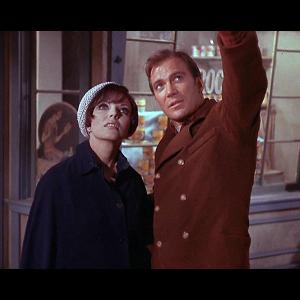
"Edith Keeler must die." |
#1
"The City on the Edge of Forever" (TOS)
| 
"Edith Keeler must die." |
Long before "Save the cheerleader, save the world," there was "Edith Keeler must die." Another episode to win a Hugo Award, as well as the only episode to win a Writers Guild of America Award (credit: Harlan Ellison), "The City on the Edge of Forever" is easily the best example of what Star Trek is all about, and it should be seen by everyone. It is also the episode that set the stage for hundreds of popular science-fiction stories, movies, and television shows that deal with time travel. In the episode, the Enterprise crew comes across a sentient gateway through time, and McCoy, suffering the effects of an accidental drug overdose, jumps through it. Somehow, in the past, McCoy causes the eventual destruction of mankind, and it is up to Kirk and Spock to go back and stop him. Once in the past (1930, to be exact), Kirk falls in love with an idealistic young woman named Edith Keeler, who talks of world peace while feeding the poor. As Spock is able to learn, however, Edith Keeler is the key to the change in time, as she is supposed to be killed in a car accident that McCoy is somehow going to try to prevent. Edith Keeler surviving leads to a negotiated peace with Nazi Germany, which leads to a disastrous and apocalyptic future. Therefore, Kirk must ensure that Edith Keeler is killed, even though he has fallen in love with her. It is a bleek and heartwrenching story, but it is so well-written and produced that it somehow comes across as hopeful and touching. It is provocative, poignant, imaginative, and ground-breaking, moreso than any other episode. If you haven't seen it, go find a copy right now.
-e. magill 05/04/2009
|
|